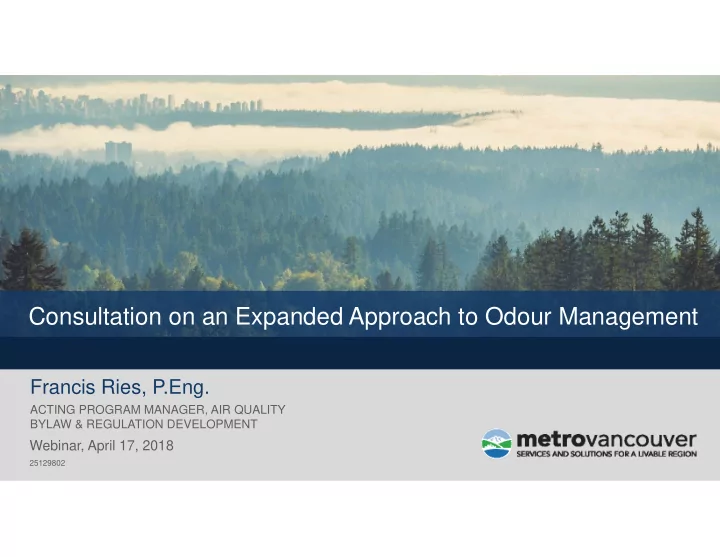

Consultation on an Expanded Approach to Odour Management Francis Ries, P.Eng. ACTING PROGRAM MANAGER, AIR QUALITY BYLAW & REGULATION DEVELOPMENT Webinar, April 17, 2018 25129802
Meeting Agenda 1:00 Welcome and Introductions 1:05 Presentation 1:20 Questions and feedback 1:55 Next steps and closing remarks 2:00 Meeting closes 2
Presentation Outline • Odorous emissions and sources • Regulatory context • Proposed approaches to odour management • Consultation program and next steps 3
Impacts of odour • Characterized by frequency, intensity, duration, offensiveness (unpleasantness), location: FIDOL • Recognized as a nuisance, but can also lead to health impacts • Nausea, eye irritation, headaches, sleep problems and respiratory symptoms • mood, anxiety and stress levels • Loss of enjoyment of property, outdoor activities 4
Odour management: a regional priority • Complaints about odours increasing, and densification likely to exacerbate this issue • Majority of AQ complaints received by MV are related to odour Year Odour Complaints/year % of total 2011 ‐ 15 1,700 80% 2016 3,800 92% 2017 4,200 93% 5
Odour management: Metro Vancouver’s role • As AQ regulator, committed to working with communities, businesses, government partners to ensure odours are managed responsibly • Improvements to current Odour Management Framework are needed to effectively and responsibly manage odours in a way that: • Respects community values • Recognizes the value business provides to the region 6
Sources of odour in Metro Vancouver • Waste management facilities • Food, feed, beverage processing and handling • Industrial and agricultural activities • Other 7
Metro Vancouver Air Quality Regulatory Structure MV Air Quality MV Air Quality Management MV Air Quality Management BC Environmental MV Air Quality Bylaw 1082 Permits Bylaw 1082 Management Act Management (150+) (Section 31) Bylaw 1082 MV Air Quality MV Air Quality MV Air Quality Management Fees Management MV Air Quality Management Regulation Bylaw 1082 Sectoral Bylaws Bylaw 1082 Bylaw 1083 (6) Cover >1000 sites 8
Current Odour Management Framework • Sector-specific regulations • Air emissions permits • Assessment and measurement of odorous air contaminants • Complaint response • Guidance documents • Community relations and outreach 9
Expanded approach for managing odour 1. Outcome-based criteria 2. Performance-based criteria 3. Technology requirements 4. Economic instruments 5. Bylaw definitions 10
1. Outcome-based criteria Odour levels would be assessed at or beyond the property line to determine compliance with Metro Vancouver’s objectives. 11
1. Outcome-based criteria Measurable criteria: • Ambient air quality criteria for odorous air contaminants • Complaint criteria • Criteria for on-site field observations 12
2. Performance-based criteria Odour levels would be measured at the facility to determine if odorous emissions are in compliance with Metro Vancouver’s bylaws. 13
2. Performance-based criteria Measurable criteria: • quantitative emission limits in permits or regulations • limits on individual contaminant emissions • limits on aggregate odour emissions (e.g. via dynamic olfactometry) 14
3. Technology requirements Facilities would be required to install specific technology and/or use best practices to comply with Metro Vancouver’s bylaws. 15
3. Technology requirements Potential requirements: • conditions for design, operation, maintenance, management of site infrastructure • best achievable technology requirements • best management practices requirements 16
4. Economic instruments Metro Vancouver would structure the fee system to encourage facilities to reduce emissions of odorous air contaminants. 17
4. Economic instruments Potential instruments: • Introduce incentives for control technology • Apply administrative fees for odour assessment • Recover costs based on authorized discharge levels 18
5. Bylaw definitions Clarifying Metro Vancouver’s core Air Quality Bylaws: • Add definitions to Bylaw 1082 and Bylaw 1083 to clarify provisions for regulating odorous air contaminants 19
Regulatory Process Flow • Discussion Paper Board 2017 • Stakeholder consultation Board Today 2018 • Draft regulatory proposal(s) Board • Stakeholder consultation Board • Final Regulation(s) Board • Regulatory Implementation 20
Seeking Input February to April 27, 2018 • Presentations • Meetings with stakeholders • Focused discussions • Webinar • Online feedback form We invite feedback to AQBylaw@metrovancouver.org 21
Questions or Comments?
Recommend
More recommend